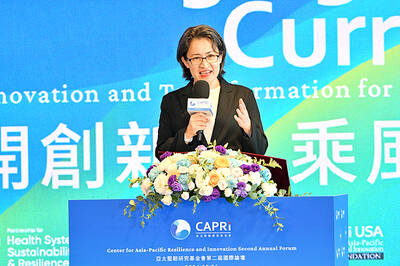The KMT's Evaluation and Discipline Committee yesterday expelled seven party members because they were seeking office under the banners of rival parties in the Dec. 1 legislative elections.
The memberships of four others were revoked for campaigning in local government races without a party nomination or campaigning for the candidates of rival parties.
The move is another mass disciplinary action on the part of the KMT, following the August expulsion of 11 members who defected to the Taiwan Solidarity Union.
The committee's chairman, Chen Kang-chin (陳庚金), explained that his committee decided to expel the seven because running for office under the banner of rival parties is considered a more serious offense than running without the party's nomination.
Although both "expulsion" and "revocation of membership" mean ouster from the party, an expulsion is a more sever punishment, according to KMT rules.
Those who have their membership revoked can have it restored one year later. Members who are expelled are not allowed to rejoin until two years after their ouster.
Of the seven expelled, four are representing the People First Party in the December poll.
They are Lu Chun-hung (呂鈞鴻), who is running in Taipei County, and three others who won the PFP's nomination for legislator-at-large: Lin Huei-kwung (林惠官), president of the Chinese Federation of Labor (中華民國全國總工會), Ku Chung-lien (顧崇廉), former commander-in-chief of the ROC Navy, and Alfred Chen (陳飛龍), the chairman of Namchow Chemical (南僑化工).
The other three are representing the Taiwan Solidarity Union. The first is Eric Wu (吳東昇), chairman of the Taiwan Securities Co (台證綜合證券公司) and a former KMT legislator, who is on the TSU's slate of legislator-at-large candidates. The second is Taoyuan County Council speaker Huang Chin-teh (黃金德), who has registered to run for the legislature in Taoyuan County. The third is Lin Wen-sheng (林文生) who is chief of the Taichung County's Hoping Township and who is running for an Aboriginal seat.
Fengshan Mayor Huang Pa-yeh (黃八野), who insists on running for Kaohsiung County commissioner despite defeat in opinion polls to party nominee Wu Kuang-hsun (吳光訓), had his membership revoked. In the same boat is Chiayi County Government adviser Chen Sheng-san (陳勝三), who is running for Chiayi County commissioner after the party nominated Wong Chung-chun (翁重鈞) for the post.
The membership of legislator Tseng Chen-nung (曾振農) was revoked for campaigning for the DPP's candidate for Chiayi County commissioner, Chen Ming-wen (陳明文).
Yen Yao-hsing (顏耀星), deputy head of the KMT's Tainan County division, received the same punishment as Tseng for campaigning for the DPP's candidate for Tainan County commissioner, Su Huan-chih (蘇煥智).
Meanwhile, violations of discipline by legislator Lin Jih-jia (林志嘉) and Kinmen County commissioner Chen Shui-tsai (陳水在) were not handled during yesterday's meeting because their local divisions have not recommended to the committee what punishment to give them, according to Chen Kang-chin.
Both politicians registered to run in the legislative elections on Thursday without the party's nomination.

NO-LIMITS PARTNERSHIP: ‘The bottom line’ is that if the US were to have a conflict with China or Russia it would likely open up a second front with the other, a US senator said Beijing and Moscow could cooperate in a conflict over Taiwan, the top US intelligence chief told the US Senate this week. “We see China and Russia, for the first time, exercising together in relation to Taiwan and recognizing that this is a place where China definitely wants Russia to be working with them, and we see no reason why they wouldn’t,” US Director of National Intelligence Avril Haines told a US Senate Committee on Armed Services hearing on Thursday. US Senator Mike Rounds asked Haines about such a potential scenario. He also asked US Defense Intelligence Agency Director Lieutenant General Jeffrey Kruse

NOVEL METHODS: The PLA has adopted new approaches and recently conducted three combat readiness drills at night which included aircraft and ships, an official said Taiwan is monitoring China’s People’s Liberation Army (PLA) exercises for changes in their size or pattern as the nation prepares for president-elect William Lai’s (賴清德) inauguration on May 20, National Security Bureau (NSB) Director-General Tsai Ming-yen (蔡明彥) said yesterday. Tsai made the comment at a meeting of the Legislative Yuan’s Foreign Affairs and National Defense Committee, in response to Democratic Progressive Party (DPP) Legislator Wang Ting-yu’s (王定宇) questions. China continues to employ a carrot-and-stick approach, in which it applies pressure with “gray zone” tactics, while attempting to entice Taiwanese with perks, Tsai said. These actions aim to help Beijing look like it has

China’s intrusive and territorial claims in the Indo-Pacific region are “illegal, coercive, aggressive and deceptive,” new US Indo-Pacific Commander Admiral Samuel Paparo said on Friday, adding that he would continue working with allies and partners to keep the area free and open. Paparo made the remarks at a change-of-command ceremony at Joint Base Pearl Harbor-Hickam in Hawaii, where he took over the command from Admiral John Aquilino. “Our world faces a complex problem set in the troubling actions of the People’s Republic of China [PRC] and its rapid buildup of forces. We must be ready to answer the PRC’s increasingly intrusive and

INSPIRING: Taiwan has been a model in the Asia-Pacific region with its democratic transition, free and fair elections and open society, the vice president-elect said Taiwan can play a leadership role in the Asia-Pacific region, vice president-elect Hsiao Bi-khim (蕭美琴) told a forum in Taipei yesterday, highlighting the nation’s resilience in the face of geopolitical challenges. “Not only can Taiwan help, but Taiwan can lead ... not only can Taiwan play a leadership role, but Taiwan’s leadership is important to the world,” Hsiao told the annual forum hosted by the Center for Asia-Pacific Resilience and Innovation think tank. Hsiao thanked Taiwan’s international friends for their long-term support, citing the example of US President Joe Biden last month signing into law a bill to provide aid to Taiwan,